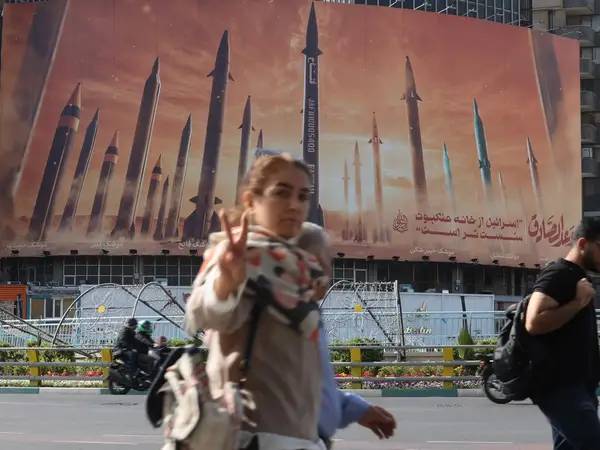Iranian women are facing tougher crackdowns for refusing to wear the compulsory hijab in the shadows of Iran’s conflict with Israel.
While news of IRGC missile and drone operations against Israel over the weekend has overshadowed other events, on Saturday, as part of what they claim is a "national and public demand," the Iranian police have begun enforcing hijab regulations on women in a new initiative called the Noor plan, Persian for ‘light’.
Morality police are also back on the streets in full force, having been scaled back since the death of Mahsa Amini in 2022, with a stronger presence around Tehran’s central districts, full of police patrols, morality vans and police motorcycle patrols.
The 22-year-old Kurdish Iranian died in morality police custody suffering severe head wounds, sparking the strongest uprising against the regime since the founding of the Islamic Republic.
Businesses that do not comply with the regulations may find themselves closed down. Announced by Tehran’s police chief, Abbas Ali Mohammadian, it signals more oppression ahead for Iran’s women and girls.
"From today the police in Tehran, as in other provinces, will implement their measures against this sort of violation of the law regarding hijab," he said on live television on Saturday.
"People who did not pay attention to previous police warnings will be specially warned in the city from today and legal action will be taken against them," he added, just days after supreme leader Ayatollah Ali Khamenei said that women in the Islamic republic must obey the dress code, regardless of their beliefs.
A social media user wrote on X: "As a woman in Iran, the possibility of being killed by morality police is much higher than being killed by the attack of the Israeli army.”
Iran Human Rights reported the increased presence “at major crossings in Tehran”, noting that it is “their most significant show of force since the “Woman, Life, Freedom” uprising.
Video clips posted on social media also show citizens reporting that their car windows were broken by officers' batons, and others saying that they were assaulted by government motorcyclists as crackdowns worsen under the cover of Iran’s escalating shadow war with Israel.
Reports also suggest vehicles being seized and their owners punished for transporting women without veils. Authorities continue to shut down cafes and restaurants where the hijab rules were not enforced.
The escalating crackdowns on women come alongside Iran’s first direct attack on Israel from Iranian soil.
Over 350 projectiles were launched on Saturday night following the alleged April 1 Israeli air strike on the Iranian consulate in Damascus in which two senior IRGC commanders were killed along with several others.
It all comes while Iran’s controversial hijab bill, officially titled "Protection of Family Through Promotion of Hijab and Chastity Culture”, is awaiting approval, but officials have all but begun enacting its draconian regulations. Women now face even greater threat of arrest and punishments including travel bans for hijab defiance.
After initially securing parliamentary approval in September 2023, the draft was rejected for review by the Guardian Council, which is the ultimate legislative authority.
